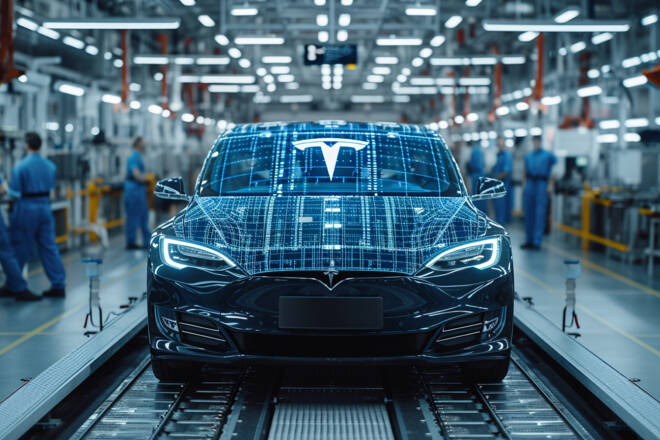Advertisement
Advertisement
Here’s What Tesla Did in the Earnings Report: Revenue Miss, Record Deliveries
By:
Tesla's (TSLA) earnings miss forecasts, record deliveries contrast with revenue shortfall and Musk's control demands cause investor debate.
Key Points
- Tesla’s earnings fall short of Wall Street expectations.
- Strong vehicle delivery numbers highlight robust market demand.
- Musk’s governance approach sparks shareholder concerns.
Tesla’s Earnings Report: A Comparative Analysis
Tesla (TSLA), a leading name in the electric vehicle industry, recently released its earnings report for the fourth quarter, attracting considerable attention from investors and industry analysts. Here is a detailed comparison of Tesla’s actual earnings with the forecasts, highlighting key financial metrics, market performance, and strategic developments.
Financial Performance
Tesla’s reported earnings were slightly below expectations, with an adjusted earning of 71 cents per share against the anticipated 74 cents, as forecasted by LSEG. Revenue also fell short, totaling $25.17 billion compared to the projected $25.6 billion. Despite these discrepancies, Tesla demonstrated robust growth in vehicle deliveries, achieving a record of over 1.8 million vehicles for 2023.
Market Position and Sales
Notably, while other U.S. automakers struggled, Tesla succeeded in maintaining high sales volumes of fully electric vehicles, thanks to significant price cuts. However, on the global stage, Chinese auto giant BYD surpassed Tesla in the last quarter, although Tesla retained its annual lead in battery electric vehicle sales.
Operational Challenges and Innovations
Amid rising domestic labor costs, Tesla has increased wages to remain competitive with other major automakers. The company also faces union pressures in Scandinavia and legal and regulatory challenges in the U.S. and Europe. Despite these hurdles, Tesla is actively expanding into AI and robotics, with plans for data centers, supercomputers, and a humanoid robot, Optimus.
Governance and Shareholder Concerns
Elon Musk’s recent demands for increased voting control in Tesla have raised concerns among shareholders and analysts. Musk’s insistence on approximately 25% voting power to lead Tesla’s expansion in AI and robotics has been met with criticism, with some viewing it as exerting undue influence over the company’s direction.
Short-Term Market Forecast
Looking ahead, Tesla’s mixed financial performance, coupled with operational and governance challenges, suggests a cautious outlook. While the company’s strong delivery numbers and ongoing innovation underscore its market leadership, shareholder concerns and competitive pressures may weigh on its short-term performance. Investors should expect some volatility as the market digests these developments, with a generally cautious but watchful stance towards Tesla’s future moves.
Conclusion
Tesla’s latest earnings report presents a mixed picture, combining robust sales figures with slight misses on financial expectations and ongoing challenges in governance and market competition. As the electric vehicle market continues to evolve rapidly, Tesla’s ability to navigate these complexities will be critical to its ongoing success and market position.
About the Author
James Hyerczykauthor
James Hyerczyk is a U.S. based seasoned technical analyst and educator with over 40 years of experience in market analysis and trading, specializing in chart patterns and price movement. He is the author of two books on technical analysis and has a background in both futures and stock markets.
Advertisement
